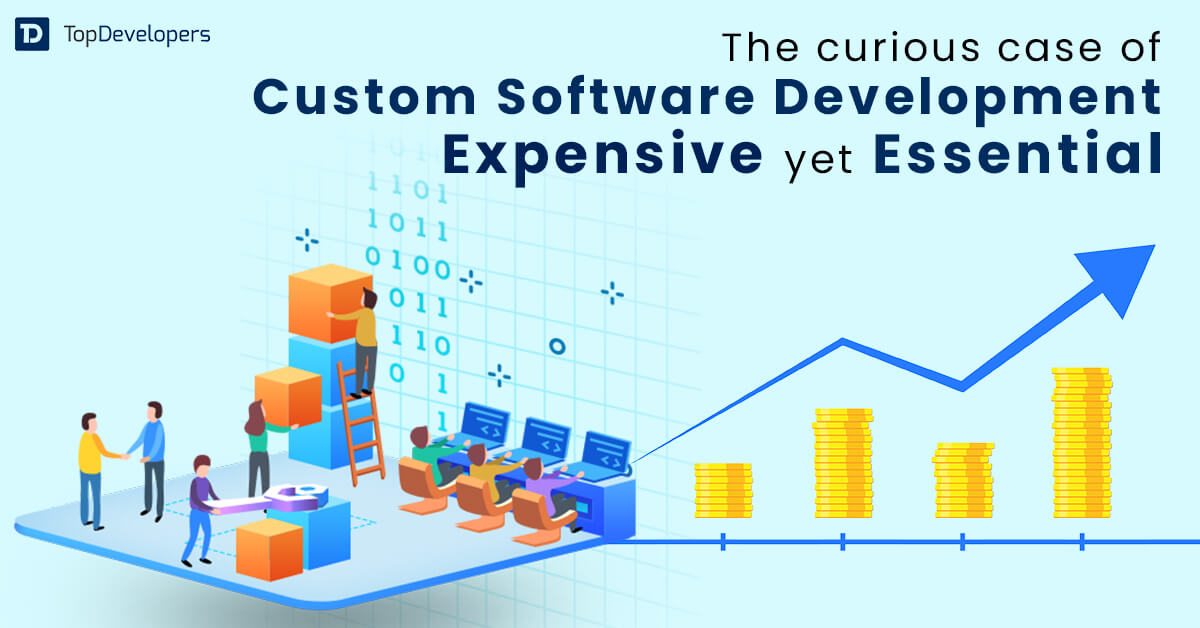
Businesses are quite concerned about their software development because a lot will depend on their software system in the future. Software development companies develop two types of software for enterprises: Custom software and Off-the-shelf software. Custom software is built explicitly for business objectives, while off-the-shelf software is a ready-made solution, and available for anyone to purchase or subscribe to, and use.
Both options have their own pros and cons based on users’ requirements, budgets, and preferences. After reading this guide, you will be able to compare and contrast readymade software solutions and customized software development to decide which one is best for your enterprise.
Table of Contents
What is Off-the-Shelf Software?
Off-the-shelf software solutions are software applications that are developed by a third-party vendor and can be purchased and used by different customers. Off-the-shelf software is also known as packaged software, readymade solutions, or white-label software. Some examples of such solutions include Amazon, Grubhub, Microsoft Office, Uber Eats, QuickBooks, and so on.
Off-the-shelf, popularly known as Readymade software solutions have some pros and cons that enterprises should consider before buying them. Here are some of them:
Advantages of Off-the-Shelf Software:
- Readymade software solutions are cheaper and faster to acquire than custom software development, as they do not require any development time or resources.
- Such software tools are tested and proven by the software development solution providers and other customers, so they are likely to have fewer bugs and errors than custom software solutions.
- Off-the-shelf software is regularly updated and maintained by the vendor, so customers do not have to worry about compatibility issues or security vulnerabilities.
- They are widely used and supported by a large community of users and experts, so companies can easily find help and guidance when needed.
Disadvantages of Off-the-Shelf Software:
- Readymade software solutions may not meet all the specific needs and preferences of customers, as they are designed for a general audience and purpose.
- Off-the-shelf software products may have some features or functions that customers do not need or want, which can result in wasted resources or reduced performance.
- Such software solutions may limit the flexibility and creativity of customers, as they have to adapt to the existing functionality and interface of the software rather than create their own.
- Readymade software solutions could pose some risks of data breach or loss, as companies have to share their data with the vendor or other third-party services that the software relies on.
Experts opine that off-the-shelf software solutions can be a good option for enterprises that need a quick and easy solution for their business operations, but they may not be suitable for companies that need a more customized and unique solution for any specific goals. Businesses should weigh the pros and cons of readymade software solutions before making a purchase decision.
What is Customized Software or Tailor-Made Software?
On the other hand, customization of software, also known as tailored software, is the process of developing a software product to meet the specific objectives or scopes of a company or an organization. Custom software is developed by the developers/programmers/engineers, or the software development service provider.
Benefits of Custom Software:
- Improving user satisfaction and productivity by providing a tailored user experience
- Enhancing functionality and performance by adding or removing features
- Increasing compatibility and interoperability by integrating with other systems or platforms
- Reducing costs and risks by eliminating unnecessary or unwanted components
Drawbacks of Custom Software:
- Increasing complexity and maintenance by introducing changes that may affect the stability or security of the software
- Reducing flexibility and scalability by limiting the ability to upgrade or modify the software in the future
- Creating dependency and lock-in by making the software-reliant on a specific vendor or provider
- Violating standards and regulations by deviating from the original specifications or requirements of the software
Hence, custom software development is carried out carefully and strategically by keeping the pros and cons of each option in mind. Tailoring is also aligned with the company’s goals and business objectives with no compromise on the quality or integrity of the software.
Tips to hire best software developers to build custom software
Difference between Custom Software and Off-the-Shelf Solutions
Since off-the-shelf software and custom software have their own way of functioning and features to offer end users, here we get you the list of fair differences. Enterprises and business owners can go through each of them.
Broadly, there are differences between custom software and off-the-shelf software solutions in the context of several factors mentioned here:
- Cost
- Features and functionalities
- Time to develop and implement
- Usefulness
- User experience
- Compatibility
Let us compare the two types of software solutions in the following aspects:
Cost
Custom software is generally costlier than off-the-shelf software, as it asks for more time, resources, and expertise to build. However, custom software may also save some money in the long run because companies may not need additional software licenses, maintenance fees, or upgrades compared to readymade software solutions.
Off-the-shelf software, on the other hand, is cheaper upfront, because it is produced with general features, and at a fixed price. Furthermore, such readymade software products incur hidden costs such as extra charges for personalization, integration, or subscription.
Features and Functionalities
Though all types of software undergo the same software development life cycle, customized software has the advantage of including features and functionalities that are personalized to the client’s needs and preferences. It can also be modified or updated as the market demands or customer needs change in the future.
On its counterpart, Off-the-shelf software has the drawback of features and functionalities that may not suit the business objectives. The tools could have needless or redundant features that can clutter the interface or slow down the performance.
Time to Develop and Implement
Custom software would take a bit longer to develop and implement as compared to their counterpart off-the-shelf software. This is because the former one requires precise planning, intuitive designing, development, vigorous testing, and debugging. It also requires better communication and collaboration between the client and the dedicated software development team.
Instead, off-the-shelf software solutions would take a shorter period to build and deploy. Such software are already available and ready to use. They also require less or no communication between parties. Software development companies often provide tutorial videos and documentation through which buyers can learn how to operate or use.
Usefulness
Custom software product is more useful than off-the-shelf software, as it can meet your specific business goals and project objectives. It can also provide a competitive edge or a unique value proposition to you.
However, off-the-shelf software is comparatively less useful because it may not completely meet the product’s scope or your vision. Such readymade solutions are generic or common solutions that do not differentiate the client from others or from the industry.
User Experience
Design is an important part of any software; in other words, the designing phase in SDLC would decide how software shall entice and engage the users. Tailor-made software applications are known to have better user experience than readymade ones because they are built with a more intuitive, user-friendly, and personalized interface. The customization is performed to enhance user satisfaction and engagement.
Besides, off-the-shelf software could provide a monotonous user experience as UI is generalized keeping all industries and users as a common entity. As a result, readymade solutions may result in not top-notch UX.
Compatibility
For compatibility, the custom-developed software is easier to sync with other software solutions because it can work seamlessly with your existing systems, platforms, and devices. Tailor-made software are smooth to integrate with other applications or services.
Instead, off-the-shelf software is comparatively less compatible compared to custom software as it may find it difficult to get in sync with other existing software solutions or systems. You may also need additional hardware or software for readymade software solutions to function properly or optimally.
As you see, custom software and off-the-shelf software solutions have their own benefits and loopholes, but the choice between them depends on various factors such as your project type, scope, and purpose.
What is better: Custom Software or Off-the-Shelf Software?
This guide provided an answer to a common question for enterprises whether to choose customized or off-the-shelf software solutions. Each option has its advantages and disadvantages, and the choice depends on various factors such as the budget, the requirements, the scalability, and the security of the software.
Custom software is designed and developed for the specific needs and preferences of the enterprise, while off-the-shelf software is made for a general audience and may not match all the expectations of the enterprise. Custom-built software can provide more flexibility, functionality, and compatibility with the existing systems of the enterprise, but it can also be more expensive, time-consuming, and risky to develop and maintain.
Software off the shelf can be cheaper, faster, and easier to implement and update, but it can also be less adaptable, customizable, and secure than custom software. Therefore, enterprises should carefully compare the pros and cons of each option and select the one that best fits their goals and challenges.
All in all, medium-sized and large enterprises prefer building customized software solutions for their business automation. They do it by hiring dedicated developers from an offshore custom software development company. This way, they save a large chunk of money without compromising on their product’s quality.
Time to equip your Enterprise with the Best Software
To summarize off-the-shelf software vs custom software, the former one is developed for a general audience and can be purchased and used by anyone. Custom software is software that is tailor-made for your specific needs and preferences.
Both types of software solutions have their pros and cons, so you need to weigh them carefully before making a decision. If you need help with choosing the right software solution for your business, you can contact TopDevelopers.co and choose from their list of software development companies. You can get in touch and talk to their business and technology consultants for further information and guidance.
 Gillian Harper
| May 4, 2023
Gillian Harper
| May 4, 2023
A professionally engaged blogger, an entertainer, dancer, tech critic, movie buff and a quick learner with an impressive personality! I work as a Senior Process Specialist at Topdevelopers.co as I can readily solve business problems by analyzing the overall process. I’m also good at building a better rapport with people!





